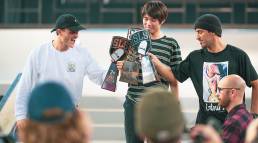What does Street League mean for British Skateboarding?
We arrive on the Friday, and it’s immediately clear from walking through the Copper Box Arena doors that this is a new breed of skate contest for the UK. The bespoke skatepark sits tastefully colour coordinated, A-list brand logos line the perimeter of the course, cameras are visibly poised for action in every direction for the live broadcast, and a host of skateboarding royalty are sat in the floor seats setting up boards and socialising ahead of the morning’s practice.
We are of course at the SLS Pro Open in London, the first ever Street League event held in the United Kingdom. Street League is the now the biggest contest in skateboarding, taking place across the globe as an annual tour of events with the largest prize purse and the highest profile athletes. Among the field are two British skaters, Harry Lintell and Korahn Gayle. Together, they are to be the first skateboarders from our shores to grace the SLS roster. It’s quickly noted that ironically (or perhaps not so) this is the first Street League event to take place in an Olympic village.
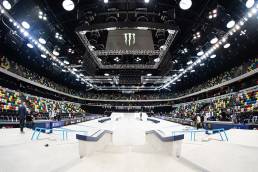
With the Pro Open qualifiers taking place on Saturday, this saw thirty skaters – eleven of which European – receive their opportunity to attempt to place in the top seven to progress into the full Street League preliminary round on Sunday. The top two finishers from this division additionally receive a pass into the full 2018 Street League tour. Harry and Korahn unfortunately did not advance past the qualification rounds, yet very much held their own with Korahn pulling arguably one of the best tricks seen down the large double stair set all weekend – an absolutely mind-bending fakie kickflip popped higher than most could fathom. Ivan Monteiro, Trent McClung and Gustavo Ribeiro comfortably took the top three spots, with Vincent Milou, Alex Midler, TJ Rogers and Mason Silva rounding off those making the cut for the following day’s prelims.
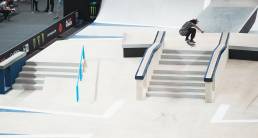
Come Sunday, the course is well worn in. Prelims take place first and the field is immediately mixed up. The newcomers from the Pro Open hold their ground as an unprecedented four of them advance to eight man final, leaving only four spots for Street League regulars Yuto Horigome, Kelvin Hoefler, Felipe Gustavo and Tiago Lemos to progress. Usual qualification suspects such as Ishod Wair, Chris Joslin and Shane O’Neill, return to their seats to unexpectedly view the impending action with the spectators.
Yuto Horigome proceeds with his usual stealthy nonchalance in the finals. Despite having a quieter presence on the course, the Japanese teenager once again lets his skating do the talking and proves precisely why you’d be a fool to count him out of the running to win any contest this year. Having put three scores of nine points or more on the board, Yuto lands his fourth vital trick to put himself well into the top spot with thirty-five points overall. Brazilian, Kelvin Hoefler, takes home the bronze, coming hot off an X Games win in Norway the previous week.
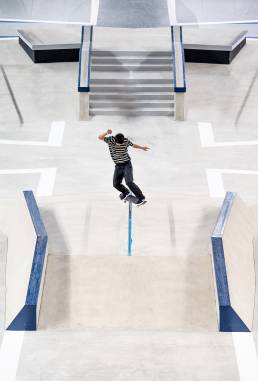
However for me, the standout result sat in second place with France’s Vincent Milou. A European podium mainstay for the past few years, Vincent seized his opportunity to skate the Pro Open division with both hands. Seeing a couple of reliable tricks slip away in his opening runs of the final, Vincent took it in his stride to leave nothing on the table throughout his five best trick attempts, securing himself silver on his final outing as he effectively gapped the double set with a pop shove it to backside fifty-fifty down the ledge. However, perhaps most importantly, this secures Vincent a spot in the SLS 2018 series.
The significance of this result is that Vincent now sits as the sole European skater on the tour. I guarantee that being such a modest individual, if you asked Vincent he would have said he was elated simply to have made the final; I’m sure within that list of riders he was unsuspecting of second. But with the skill and finesse that Vincent displayed, he was absolutely deserving of his podium placing. The Frenchman is an example of what happens when you give the next generation their moment, and will hopefully open up opportunities for future Europeans – and Brits – in years to come.
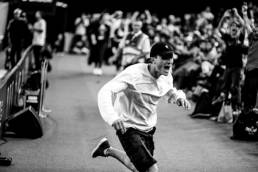
The impact of recognition has also become increasingly evident in the female contest, which for the first time sees inclusion at every SLS stop throughout 2018. Between a roster of ladies that have pushed continuously to turn heads in the skateboarding scene, the standard of female skating in the past couple of years has seen phenomenal progression. However, it became increasingly noted that the number of women that were in attendance without men to support the females during their contest was staggering, proving that both support of and participation in female skateboarding is rapidly growing in popularity; and it’s in no way relying on the guys.
The female contest took place on Saturday night, and saw American Jenn Soto take the top spot on her debut Street League appearance – proving that she’s certainly a new force to be reckoned with. Lacey Baker and Mariah Duran followed in second and third respectively, with the crowd showing their appreciation for both the female skateboarding veterans of the contest, and the newcomers looking to make their lasting mark on the scene. The one point for me that would have enhanced this event, is the presence of one of our British female skateboarders. From Helena Long to Josie Millard – we had British girls capable of being a part of the contest, and their lack of inclusion was noted. With Street League potentially returning to London next year, I hope to see some of our female talent receive the nod.
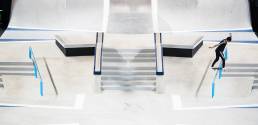
“Women’s divisions at widely broadcasted events like Street League or the X Games are crucial for the growth of female skateboarding” says Austrian professional skateboarder, Julia Brueckler. “When I started to skate about 15 years ago, I was probably the only female skater in my country. By contrast, it’s now not only perfectly acceptable for a woman to skate, but you’re seeing more and more girls picking up boards every day. In my opinion, the female skate scene in and around London is one of the biggest in Europe.”
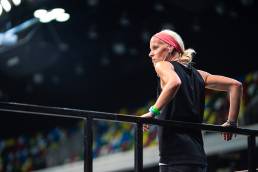
The question I found myself asking throughout the action, is whether Street League taking place in London will have further impact on British skateboarding. “I think by having SLS in London, it’ll raise awareness of skateboarding in a really positive way” Korahn Gayle stated course-side, following his qualifying heat. “I really hope that this can lead to more funding for skate facilities, both in London and across the UK.”
For me personally, the first British Street League event highlighted the importance of recognition, exposure and opportunity. The core layer of skateboarding will always exist; it’s where skateboarding began, and our community is the thing we hold closest to us. However with skating’s ongoing growth in popularity, interest in the activity and its individuals has potentially hit an all-time high. Granted, many opportunities from this are often corporately led – but what we can do as skateboarders is work with these ventures to ensure that positive effects are felt within the grass roots of skateboarding as a result.

It’s well documented that the Street League contests receive mixed reception in the skateboarding community, but I defy you to find one kid that left the event that wasn’t either inspired to pick up a board if they didn’t already own one, or to get on their board as soon as possible, motivated to learn new tricks. Finals day was a sell out, and through this not only was a British crowd witnessing the highest level of skating seen anywhere in the world, but a host of skateboarders made an impressive amount of cash in the process.
The point that I’ll leave this on is that whilst there may be corporates making money from Street League, there’s nothing to say it can’t additionally be to the benefit of British skateboarding. From pushing to give our skaters the opportunity to skate in an SLS event, to providing another great argument for funding new skateparks – there’s ways that we can use the profile of events like this to enhance skateboarding in our immediate communities. And who knows, little Billy that saw Yuto land every single tre-flip down the double set effortlessly, might just pop on down to his local skate shop to buy his first board.
